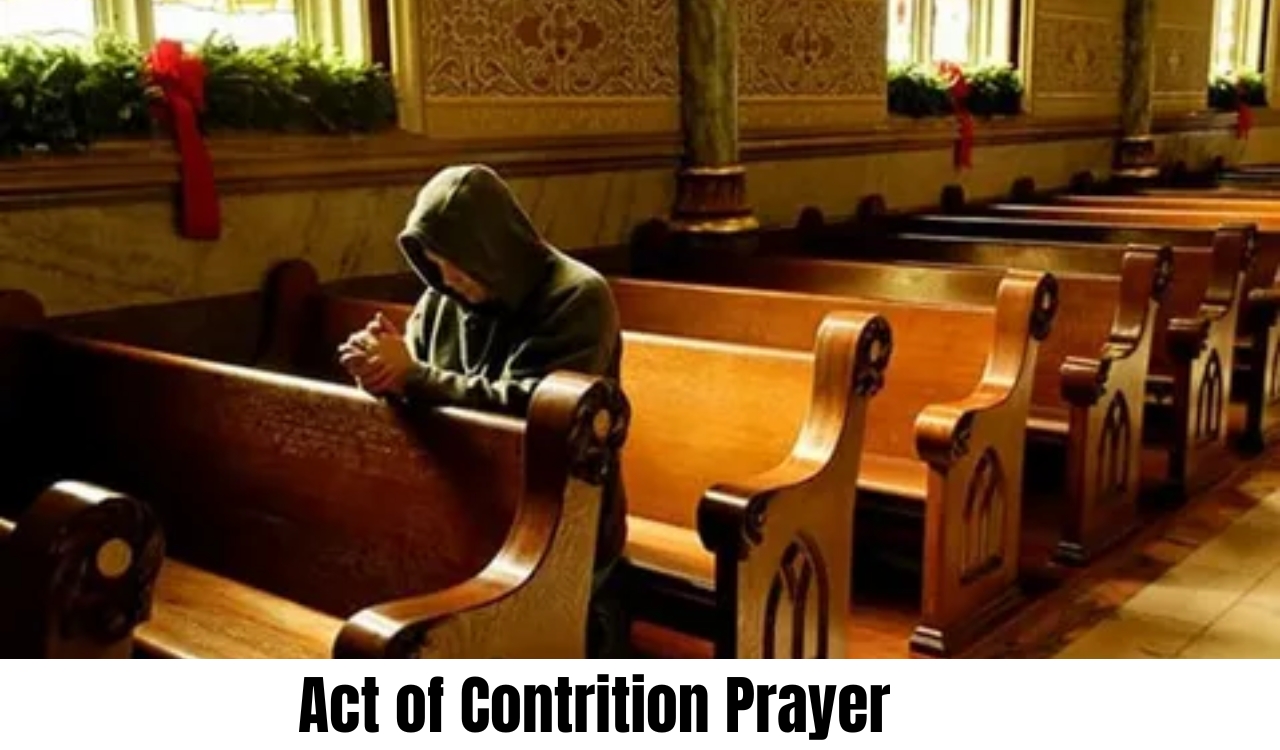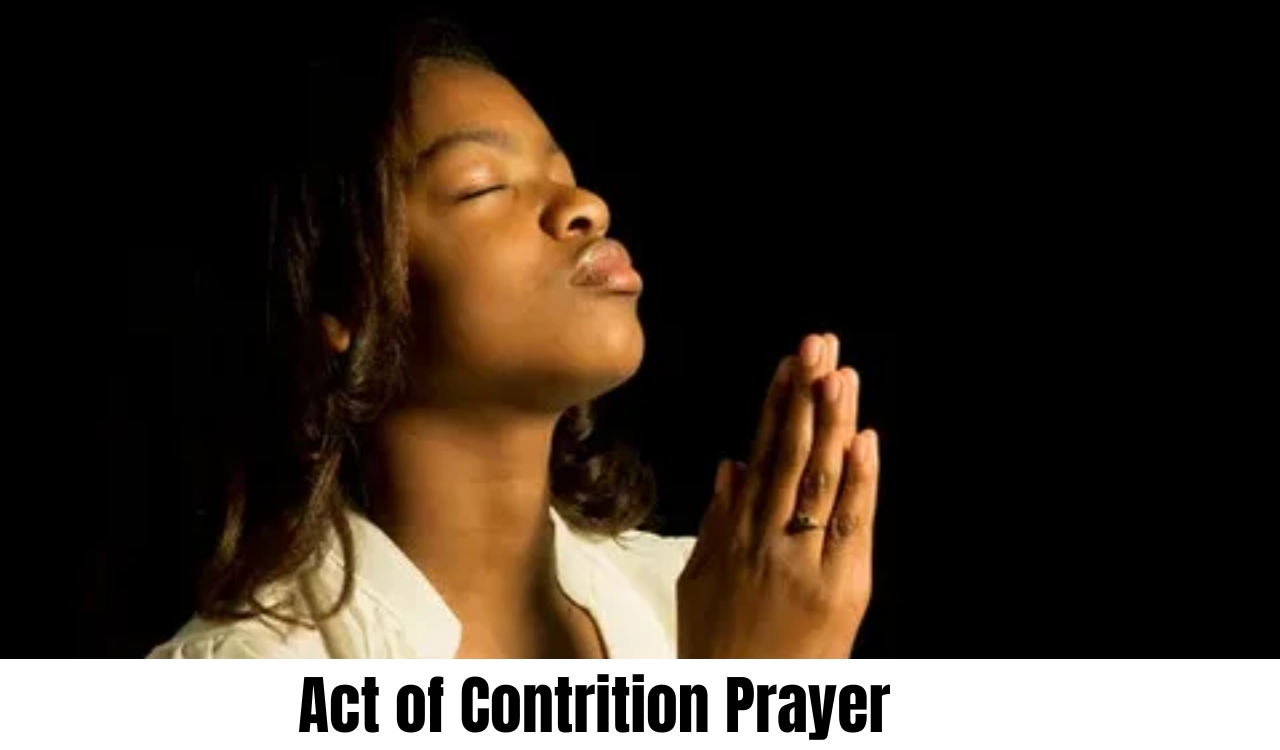The Act of Contrition Prayer is one of the most profound and meaningful prayers in Catholic tradition. It is a sincere expression of repentance, where believers show true sorrow for their sins and turn back to God’s mercy. This prayer is deeply connected to the Sacrament of Confession, but its use extends far beyond the confessional. Catholics often recite it during personal reflection, daily prayer, or in times of spiritual struggle.
Through the Act of Contrition, the faithful ask God for forgiveness, strength to resist future temptation, and renewal of faith. It is more than words; it is a heartfelt commitment to live in humility, obedience, and love for God.
Meaning of the Act of Contrition

At its core, the Act of Contrition Prayer expresses repentance, humility, and a desire for change. It reminds us that God’s mercy is greater than sin, offering peace and healing to all who sincerely seek forgiveness. By praying it, believers admit their faults, promise to turn away from sin, and renew their trust in God’s compassion.
“Forgiveness begins when the heart bends in humility, acknowledging sin and opening to divine love.”
The prayer teaches that repentance is not about fear but about love. True contrition is strength—it takes courage to admit mistakes and trust God’s mercy.
History and Origins
The Act of Contrition Prayer developed within Catholic tradition, especially in the Sacrament of Reconciliation. Over centuries, different versions have been written, but all carry the same essence: sorrow for sin and trust in God’s forgiveness. Its history shows that every generation has needed a way to seek mercy and peace.
“The history of contrition reminds us that forgiveness is timeless, traveling through generations as a gift of mercy and grace.”
This continuity reveals the universal human need for repentance, healing, and spiritual renewal across cultures and time.
Repentance in Christianity
In Christianity, repentance means turning away from sin and returning to God. The Act of Contrition is central to this process because it combines sorrow with hope. It is not only about admitting guilt—it is about building a bridge between sin and salvation.
“Repentance is the bridge between sin and salvation, built on humility and trust in divine love.”
Through contrition, believers grow spiritually, finding peace and strength to live faithfully again.
Why the Prayer Still Matters Today

Modern life is filled with distractions, stress, and moral challenges. The Act of Contrition Prayer remains just as relevant today as it was centuries ago. It calls people to pause, reflect, and return to God’s mercy in the midst of daily struggles. By making this prayer part of life, believers find comfort, clarity, and spiritual renewal.
“In today’s world, contrition grounds us, reminding hearts that God’s mercy is stronger than sin and doubt.”
Whether spoken during confession or whispered in a quiet moment, the prayer keeps faith alive, turning guilt into peace.
Traditional and Modern Versions
There are two main forms of the Act of Contrition Prayer: the traditional and the modern.
- The traditional version carries the wisdom of centuries, filled with reverence and devotion.
- The modern version uses simpler words, making it easier for people to understand while keeping the same spiritual depth.
“Modern prayer makes repentance simple, yet deeply powerful in meaning.”
Both versions express the same truth: God’s mercy is always ready to welcome a repentant heart.
Act of Contrition for Children and Daily Life
Children also learn the Act of Contrition Prayer, often in a simpler form with easy words. Teaching it early helps them understand forgiveness, repentance, and God’s unconditional love.
“Teaching contrition to children plants seeds of faith early in their hearts.”
Beyond childhood and confession, this prayer is valuable for daily life. Many Catholics use it in personal prayer, as a way to stay humble, reflect on their actions, and remain close to God. A short version is also helpful during busy days, showing that sincerity matters more than length.
Role in Confession and Personal Reflection
The Act of Contrition plays a vital role in the Sacrament of Confession. After admitting sins, believers recite it as a sign of genuine repentance and a promise to live better. Guided by priests, this prayer brings peace and forgiveness, turning guilt into grace.
“Confession becomes powerful when contrition is sincere, because God’s mercy enters hearts that open honestly, admitting sin and asking forgiveness humbly.”
It is also powerful outside confession. In personal meditation, the prayer helps believers examine their conscience, admit failures, and seek healing.
Spiritual and Psychological Benefits
Praying the Act of Contrition Prayer has both spiritual and psychological benefits. Spiritually, it strengthens faith, deepens humility, and builds a closer relationship with God. Psychologically, it relieves guilt, brings peace of mind, and restores balance.
“Contrition heals the mind as much as the spirit, bringing inner balance.”
In hard times, this prayer is a source of strength, comfort, and hope. It reminds believers that no matter how heavy the burden, God’s love is greater.
Conclusion
The Act of Contrition Prayer is more than a traditional Catholic prayer—it is a path to forgiveness, peace, and spiritual renewal. It teaches repentance, humility, and trust in God’s mercy. Whether recited in confession, daily reflection, or during life’s hardest moments, it reminds us that God’s compassion is endless.
Making this prayer part of life helps believers grow in faith, overcome weakness, and live with a renewed spirit. Through sincere contrition, every heart can find healing, strength, and a deeper connection with God.
You Must Read About “150+ Saturday Prayers and Blessings“

